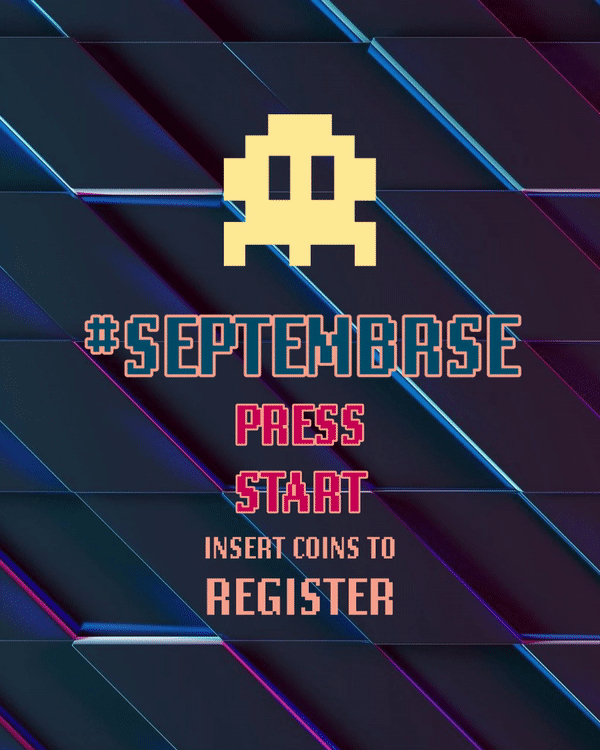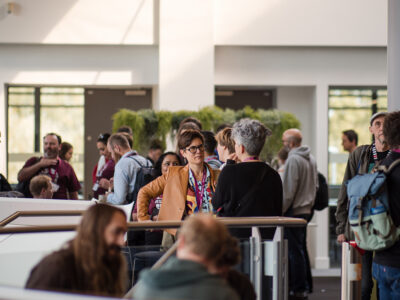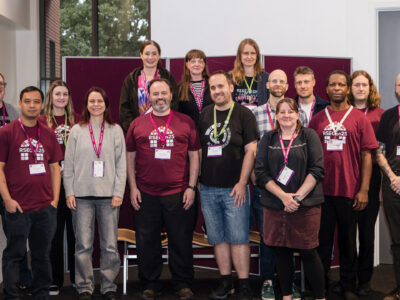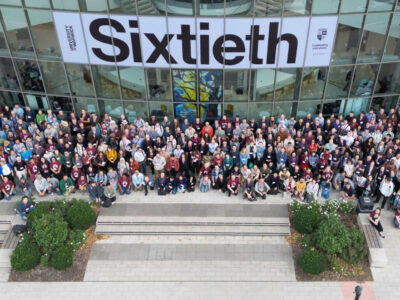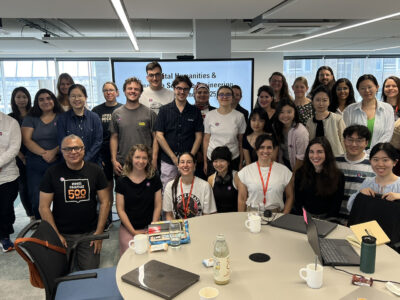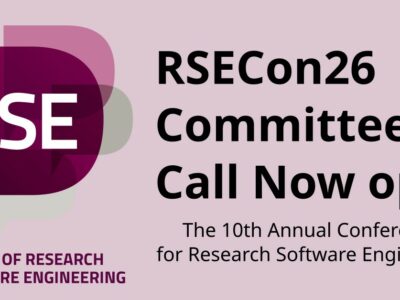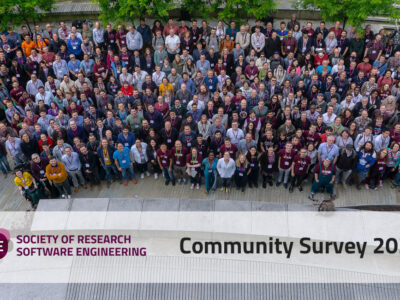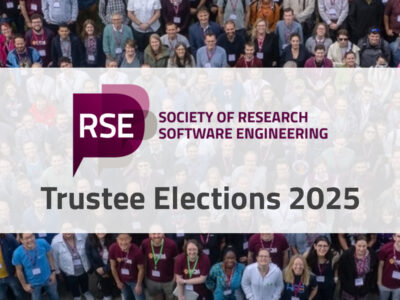Reflections on SeptembRSE
From Christopher Woods
What a month! Back in April when I first proposed the idea of spreading the RSE conference over a month, even I thought it was a little mad. Amazingly the community got on board and it is a testament to them and the wonderful SeptembRSE organising committee that we were able to put on a full timetable of events! However, looking at both the feedback and how hard this was to put together, I suspect we won’t be repeating this experiment ;-).
From the feedback it was clear that it was hard to block out time to attend everything, and being too spread out meant that the later parts of the conference were lost. I agree with the suggestion of many of condensing the conference down to one week – although how that could be achieved without resorting to parallel sessions is an open question. Running parallel sessions for an online conference is challenging due to the number of licenses needed, plus the number of independent AV setups needed to reliably stream and manage multiple streams. I suspect a professional AV team would need to be employed if this was the approach used for future online RSE conferences.
The question of whether RSE22 should be online was raised throughout SeptembRSE. The conference was an experiment, and we did our best to make the most of online tech. We deliberately didn’t answer the question of whether RSE22 will be online because this is a community conference and the Society rightly wanted to wait for feedback from the community about SeptembRSE. Looking at that feedback (which ~30% of attendees completed), 93% scored SeptembRSE as 3 or more, with 71% scoring as a 4 or 5. Even better, 94% rated the virtual conference center (Zoom, sli.do and gather.town) as 3 or above, with 78% scoring as a 4 or 5. We are very thankful for all of the kind words about our efforts in the feedback – it is really clear that people appreciated the care and detail we put into the different platforms (Zoom, sli.do and gather.town), even if the music was not to everyone’s taste ;-). Certainly I could do with not hearing any more chip tunes for a while…
Looking at the comments, the vast majority of feedback was very positive about the online event, albeit with the caveat that most people missed being able to meet up and network in person. There were positives about being online, the most appreciated of which was our uploading of events to YouTube each evening and the lack of parallel sessions meaning that people didn’t have to choose between competing sessions. But, despite this, on the question of whether RSE22 should be online, only 22% said yes. 34% want RSE22 to be in-person, while 44% want it to be a blended event.
Does this mean that our experiment was a failure? I think not. I think SeptembRSE was as good as was possible for an online event, but being online really highlighted the value of being in-person (e.g. meeting and talking to people over a real drink). I don’t think the Society should switch over to fully online conferences. However, I would caution that a blended event would likely not work. My experience of organising SeptembRSE was that it was completely different to organising an in-person conference, e.g. like RSE17. SeptembRSE was more like running a TV channel, and what we did every day, and the things that had to be organised and what we worried about was massively different to what we did, organised and worried about for an in-person conference. My belief is that organising a blended conference would turn into organising two separate conferences, with one compromising the other. Instead, my opinion is that the RSE conference should alternate between being online and in-person, e.g. be in-person on even years and online for odd years. That way the conference could still be accessible to the RSEs who cannot travel or who cannot afford expensive in-person conferences, while it can retain its appeal to RSEs who want to meet up in person and network. An additional benefit is that the environmental impact of RSE conferences would be (roughly) halved, as there would be half as many in-person conferences if they are only held every other year.
Another divisive part of the conference was gather.town. About a third of people who filled in the feedback survey really loved the gather.town virtual conference center, while there was also a vocal group who really hated it. Gather opened up opportunities for us to try new things (e.g. the treasure hunt and discussion posters), but at the cost of making the conference less accessible to those with reduced vision, and more intimidating to those who didn’t have the confidence to walk up to and talk to someone they didn’t know. I definitely respect the feedback that walking up to someone new in-person is difficult, but walking up to someone’s avatar in gather was even more challenging and intimidating. It didn’t help that when someone had made the leap of confidence, they were often met with the “zombie” avatars of attendees who had left the tab. One bit of feedback I’d have to the gather developers is to give the option to automatically disconnect and disappear inactive avatars. This way, at least you know there is a real person sitting behind the screen. While gather was a bit of fun, even I will admit that it became more of a novelty or gimmick as the conference progressed. It likely wouldn’t be useful for future online conferences, and certainly wouldn’t be worth the time and effort to design and build another virtual conference center.
One of the joys of SeptembRSE was watching the RSE Worldwide Session. I have watched this grow throughout the RSE conferences, and it was really nice to see this running across a full day with attendees from nearly all continents. The online format really suited RSE Worldwide, and it felt like it has now grown into something that deserves its own event, rather than being packaged as part of the UK RSE conference. Indeed, I don’t see how RSE Worldwide could now be squashed back down to run as a one-hour session in an in-person RSE conference. Instead, I suggest that RSE Worldwide is crafted into its own online event that could perhaps be run annually, using the same one day, timezone-spanning format.
Similarly, I have an affinity for the workshops, having been workshop chair for the first RSE conference, RSE16. Workshops have always been a challenge to schedule in the conferences due to their strict requirements (much longer than a talk, but often with limited capacity so require separate registration, and technical requirements that require software to be installed – I still have nightmares about the 200+ USB sticks at RSE16). Workshops tend to have a more niche audience, and their length (a half day, or sometimes all day) forced attendees of the in-person conferences to choose between attending one workshop or a lot of talks. RSE19 tried to solve this by moving the workshops to the extra third day. However, many attendees left on the second day after the talks, and the increased cost of running the conference for an extra day was not balanced by any increase in income, thus making the conference more expensive to run. We tried to solve this for SeptembRSE by not having any overlapping sessions. However, attendances to workshops were low. Feedback indicated that registration was a barrier, as well as just not being able to book off a whole afternoon or whole day out of work. As such, I suggest that workshops are also something that are spun out into their own events. Perhaps the Society could provide a platform for a regular online workshop series, and get volunteers to host them (maybe on Wednesday afternoons)? And, having done this, then dropping workshops from RSE22.
The biggest surprise of SeptembRSE were the Discussion Posters. These were spun out from the Discussion sessions. The Discussion sessions themselves had mixed reviews. Some didn’t like the coldness of not being able to ask questions of the participants, while others really enjoyed the flow of the chat, and the side-discussion in slack. But the Discussion Posters were really liked. There was lots of engagement and the weekly updates of the posters was a highlight for me. As such, I would encourage the RSE22 committee to think about how Discussion Posters could be incorporated into an in-person conference.
Finally, I have one last piece of advice for RSE22. It is really important that a chair for this conference is identified before Christmas and a committee assembled and starting work in January. Putting on a RSE conference is a huge effort. Putting on the first in-person RSE conference post-pandemic will be especially so. Fingers crossed it is looking like the world is now moving into the recovery stage of the pandemic and I think we can be confident that RSE22 can be held in-person in September 2022. To reduce risk, perhaps it would be worth planning for a smaller conference, with maybe 150 attendees? At that size, it would be possible to return to MOSI, which was the venue for RSE16 and RSE17. Organising this conference will need to start by January at the latest just so that venues can be booked, conference themes agreed, and calls for submissions can be out by Easter. This is doable, but it will need members of the community to step up and volunteer to join the RSE22 committee. These conferences don’t happen by themselves. Organising conferences is time consuming, but massively rewarding. SeptembRSE was so much fun because lots of people gave the time and effort they could, even if it was just a few hours for a few weeks. Even if you have never helped organise a conference before, or only have a very small amount of time to give, please do consider volunteering. Every little helps 🙂
